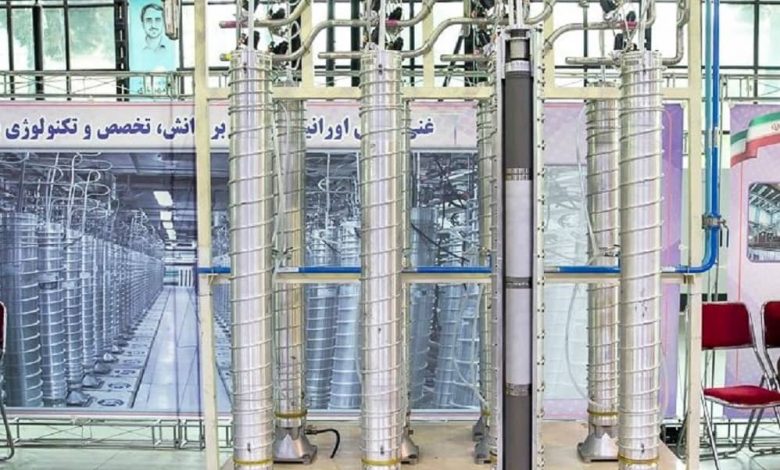Iran Nuclear Talks Bring No Change. What Is Western Powers’ Duty?

Written by
Mohammad Sadat Khansari
The long-delayed seventh round of talks aimed at restoring the 2015 Iran nuclear deal began and ended in Vienna last week. Little progress was reported, and in fact, the process moved in reverse after the Iranian regime’s main representative to the talks, Ali Bagheri Kani, declared that Tehran was free to revisit all of the terms that were tentatively agreed upon before the negotiations became stalled in June.
That delay was prompted by Ebrahim Raisi’s appointment as the regime’s new president, a development that was widely expected to lead even more aggressive policies and practices from the clerical regime. Tehran returned to the Vienna talks only after the Raisi administration spent months deflecting the issue and stating vaguely that those talks would resume soon. The patience of Western negotiating partners noticeably wore thin during that time, and after meeting in Washington, representatives from Britain, France, and Germany expressed consensus on the need to adopt an alternative approach if the Iranian regime continued its delays.
On one hand, this helps to explain Tehran’s eventual move to accept specific plans for the seventh round. But on the other hand, it raises serious questions about how meaningful that supposed change in strategy was. Tehran is only moving the process far enough forward to continue delaying its eventual outcome, which is most likely to be the final collapse of the Joint Comprehensive Plan of Action.
“As the Iranian Resistance has repeatedly underlined,” said NCRI Foreign Affairs Committee Chairman Mohammad Mohaddessin in this regarding adding, “the mullahs’ regime is trying to buy time to complete its nuclear weapons program through deception.”
Vienna talks failing shows again that #Iran’s regime, using appeasement, plunged talks into cycle of deceit to buy time & make the bomb. Khamenei’s fate is tied to his nuclear program, another reason why Raisi was selected president. This cycle must be ended with a firm approach
— Mohammad Mohaddessin (@Mohaddessin) December 4, 2021
If the seventh round of Vienna talks accomplished one thing, it was lending more credence to this account of the regime’s behavior. After the week’s discussions concluded, US Secretary of State Antony Blinken observed that “Iran right now does not seem to be serious about doing what’s necessary to return to compliance,” while representatives of Britain, France, and Germany told the media that Iran’s positions “were incompatible with the deal’s terms or went beyond them.”
Furthermore, Bagheri Kani proclaimed that the regime “will not back down from its demands,” but is prepared to keep the JCPOA on life support while endlessly reiterating those demands. Even before the Raisi administration took over, Tehran had repeatedly declared that it expected the European Union to exert pressure on the US leading to the wholesale suspension of economic sanctions. Since the regime’s presidential transition, it has become entirely clear that this demand is not limited to nuclear-related sanctions but also includes those addressing terrorist acts and human rights abuses.
US official: Iran to blame for fallout of nuclear talks
Tehran has offered absolutely nothing in exchange for those sanctions but has indicated that negotiations over a return to compliance would proceed only after the US agreed to provide relief according to a verifiable process. This, of course, is a non-starter for all both the US and its European allies. The regime’s absolute refusal to budge from that position last week should have resulted in those nations walking away from the existing agreement and adopting a new strategy altogether.
It is presently not clear what the JCPOA’s Western signatories hope to accomplish by drawing out the process and scheduling an eighth round of Vienna talks as they are expected to. All that can be said for certain is that they remain unwilling to let go of the already-dead deal, much less to adopt a course of action that disregards the long-stalled negotiations as a failure. But this flies in the face of those same powers’ statements in advance of the seventh round, which affirmed that Iran would need to face consequences for continuing to stall.
The nature of those consequences was never specified, but the US State Department said repeatedly that all options were on the table. The only option, however, is to restore sanctions and increase pressure on Iran’s rouge regime. Sanctions have already crippled the regime’s economy even as the regime has been forced to increase government expenditures in an effort to suppress growing domestic unrest.
Iran state media warn about failure of nuclear talks
Together, these circumstances make Tehran uniquely vulnerable, and that vulnerability could be effectively exploited by collective Western action.
Secretary Blinken’s public frustration with Tehran’s actions last week may signal the administration’s potential willingness to follow through on its promise of enhanced pressure and consequences for the regime. But for the time being, the JCPOA signatories appear poised to continue treading the same path by scheduling yet another round of “negotiations” in which Tehran has flatly refused to negotiate.
Iran Nuclear Talks Bring No Change. What Is Western Powers’ Duty?

